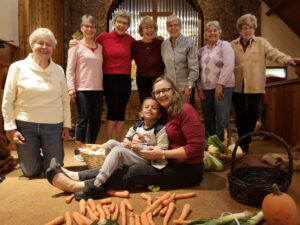This sermon was followed by brief remarks from Dawn Bostock, director of Omega Community Resources, the West Island mental health organization which receives the donations of the produce that decorates our nave each Thanksgiving.
All Saints by the Lake
Harvest Thanksgiving, Year C
October 13, 2019

The decorating team arranging the Thanksgiving produce on Saturday!
One of the things that a lot of people don’t realize about the law of Moses is how deeply agricultural it is. Cheek by jowl with some of the rules about things like stoning people to death, which we now rightly ignore, are principles about the care of the earth that are still profoundly relevant to our life today. Things like not harvesting the fruit of a tree until it’s had a few years to grow, not planting every field to the very edge but leaving a margin for the wildflowers and the creatures, leaving the gleanings of the grain for the poor and the stranger to pick up, and letting the land rest every seven years. This is stewardship at its most practical, how to treat the soil so that it will keep feeding you for years to come.
The scholarly term for this concept is “the Levitical land ethic” and that is where our Old Testament reading this morning is rooted. At the end of the book of Deuteronomy, after chapters and chapters of detailed laws, they are summed up in this ritual of the first fruits. As the people come into the land they have been promised, they offer to God the very first crops from their new fields, to indicate their acceptance of the covenant God has made for them, and their intention to steward and nurture the land that is in their care.
There are three things that I want to point out about this ritual that are relevant to or practice of stewardship today.
The first is that it is, indeed, the first fruits that are offered, not what’s leftover. We include God in our giving right from the beginning, and we give God our best, not the things we have no use for.
The second is that stewardship is rooted in our history and what God has done for us. The people are commanded always to be mindful that God brought them out of slavery in Egypt, and to make their gifts in gratitude for their deliverance. We, likewise, remember what God has done for us and the blessings we have received, and give out of a grateful heart.
And Israel’s history of liberation from bondage is also a reminder that they are to be generous not only to God, but to others who are aliens and wanderers as they once were. They are to care for the refugees in their land, and not oppress them.
And the third thing I want to point out is that the land ethic in the law of Moses is about stewardship for the long term. You care for the thing that gives you life – the land, your “capital,” so to speak, whatever it is that gives you the ability to make a living – and you make sure that it lasts, so that you can keep giving, to God and others.
This is not to say that there are no times when we are called upon to give sacrificially, to pour out our substance on behalf of others. But as a general principle, it’s a good one. The people need to steward their land so that it will stay healthy and fruitful and keep nourishing them for many generations to come.
There is an obvious connection here for our contemporary understanding of our relationship with the planet on which we all depend for everything we need. But it is also relevant to our personal practice of giving. It may be that we depend on ourselves, on our health and functioning, in order to be able to make a living and serve others, in which case our self-care is also a form of stewardship. Conversely, if we have been given much, it is our burden and responsibility not to squander that blessing, but to figure out how to steward it for the good of all, not just ourselves.
In essence, what I’m talking about is sustainability: of the land, of our own lives, of the good we hope to do in the world.
Stewardship is something we should pray about, and talk about, and support each other in; there is no substitute for discernment in community. We should be having the conversation about both the stewardship of the earth, and our giving to do God’s work through the church and in the world, and everything in between. We should give our best, with grateful hearts, for the long haul. And then, as Paul promises, the peace of God will guard our hearts and minds; and, as Jesus promises, we will have the bread of life, forever.
Amen.
Leave a Reply